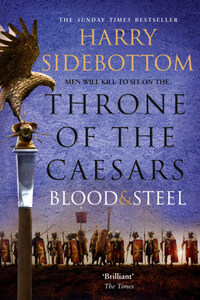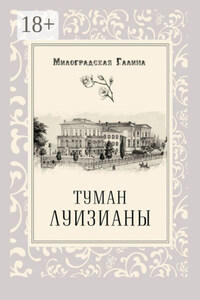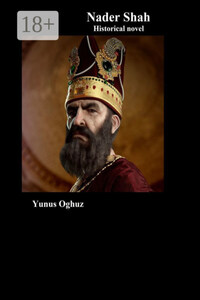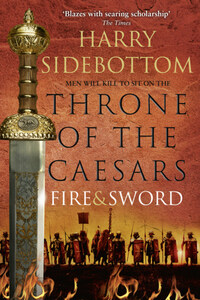Harper
An imprint of HarperCollinsPublishers
1 London Bridge Street
London SE1 9GF
www.harpercollins.co.uk
Published by HarperCollinsPublishers 2015
Copyright © Harry Sidebottom 2015
Maps © John Gilkes 2015
Cover design by Claire Ward © HarperCollinsPublishers Ltd 2016
Cover photographs © Stephen Mulcahey/Arcangel Images (Roman eagle and Soldiers); Shutterstock.com (texture)
Harry Sidebottom asserts the moral right to be identified as the author of this work
A catalogue record for this book is available from the British Library
This novel is entirely a work of fiction. The names, characters and incidents portrayed in it, while at times based on historical figures, are the work of the authorâs imagination.
All rights reserved under International and Pan-American Copyright Conventions. By payment of the required fees, you have been granted the non-exclusive, non-transferable right to access and read the text of this e-book on-screen. No part of this text may be reproduced, transmitted, down-loaded, decompiled, reverse engineered, or stored in or introduced into any information storage and retrieval system, in any form or by any means, whether electronic or mechanical, now known or hereinafter invented, without the express written permission of HarperCollins e-books
Ebook Edition © MAY 2015 ISBN: 9780007499908
Source ISBN 9780007499915
Version 2017-10-27
Do not fear god,
Do not worry about death;
What is good is easy to get, and
What is terrible is easy to endure
PHILODEMUS (HERCULANEUM PAPYRI 1005, 4.9â14)
One could press on or draw back in a private enterprise, and commit oneself more deeply or less at will, in accordance with the prospects of the moment. But in the pursuit of an empire there was no mean between the summit and the abyss
TACITUS, HISTORIES 2.74
IN ROME
Vitalianus: The Praetorian Prefect in Rome, and Sabinus, Prefect of the City, officers of Maximinus
Menophilus and Valerian: Envoys of the Gordiani
Pupienus: Sometime Prefect of the City
Pupienus Maximus: His elder son
Pupienus Africanus: His younger son
Gallicanus: A Senator of Cynic views
Maecenas: His intimate friend
Balbinus: A patrician of dissolute ways
Timesitheus: The ambitious Prefect of the Grain Supply
Tranquillina: His even more ambitious wife
Maecia Faustina: Daughter of Gordian the Elder, sister of Gordian the Younger
Marcus Junius Balbus: Her young son
The die-cutter: A workman in the Mint
Castricius: His young and disreputable neighbour
Caenis: A prostitute visited by both
IN AFRICA
Gordian the Elder: Formerly governor of Africa Proconsularis, now proclaimed Emperor
Gordian the Younger: His son and legate, also now proclaimed Emperor
Arrian and Sabinianus: Their supporters
Capelianus: Governor of Numidia, and enemy of Gordian
IN THE NORTH
Maximinus Thrax: The Emperor
Caecilia Paulina: His deceased wife
Verus Maximus: His son and heir
Iunia Fadilla: Wife of Verus Maximus
Apsines of Gadara: Secretary to Maximinus
Flavius Vopiscus: Senatorial governor of Pannonia Superior
Honoratus: Senatorial governor of Moesia Inferior
Anullinus: Senior Praetorian Prefect
Volo: The commander of the frumentarii
Domitius: The Prefect of the Camp
Julius Capitolinus: Equestrian commander of 2nd legion Parthica
Sabinus Modestus: Commander of the heavy cavalry, cousin of Timesitheus
IN THE WEST
Decius: Governor of Hispania Tarraconensis, loyalist of Maximinus
IN THE EAST
Priscus: Equestrian governor of Mesopotamia
Philip: His brother
Otacilius Severianus: Governor of Syria Palestina, brother-in-law of Priscus and Philip
Catius Clemens: Governor of Cappadocia, longtime supporter of Maximinus
Ardashir: Sassanid King of Kings
Rome
The Palatine Hill,
The Day before the Nones of March, AD238
It was still dark. The Praetorian Prefect liked to walk in the imperial gardens before dawn. No attendants were with him, and he carried no torch. It was a moment of calm and solitude, a time for reflection, before the duties of the day, the duties that always seemed to stretch away like a vexatious journey with no evident ending.
Vitalianus often thought about retirement, about living quietly in the country with his wife and daughters. He pictured the house in Etruria. The Via Aurelia and the busy market town of Telamon were only a couple of miles away over the hill, but they might have belonged in a different country or another age. The villa lay between the shore and the terraced slopes, looking out over the sea. It had been built by his grandfather. Vitalianus had added two new wings and a bath house. The estate now extended inland along both banks of the Umbro. It was ideal for retirement, for reading and writing, appreciating the views, for passing time with his wife, and enjoying the company of his daughters in the last few years before they married. No place was better suited for a man to lay down the cares of office.









